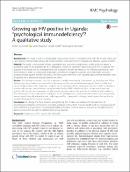Growing up HIV-positive in Uganda: “psychological immunodeficiency”? A qualitative study
Date
2017Author
Knizek, Birthe Loa
Mugisha, James
Osafo, Joseph
Kinyanda, Eugene
Metadata
Show full item recordAbstract
This study is part of a longitudinal study among children and adolescents with HIV in both urban and rural Uganda: ‘Mental health among HIV infected CHildren and Adolescents in KAmpala and Masaka, Uganda (CHAKA)’.
Method
The study is constructed of both quantitative and qualitative components. In this article we report a qualitative study on the experiences of 21 adolescents (twelve to seventeen years) living with HIV in Uganda. The purpose of the study was to investigate both the protective and the risk factors in HIV-infected adolescents’ care environment in order to understand what might contribute to negative outcomes and what might provide a protective buffer against harmful life events. Semi-structured interviews with vignettes about mental disorders were employed and a phenomenological analysis was done.
Results
The findings uncovered that the adolescents’ families were mostly characterized by instability and diffuse relationships that provided an insecure basis for secure attachment and emotional support. Even in stable and secure family environments, there was no guarantee for getting sufficient emotional support in order to develop a positive self-concept due to the fate being the only infected child in the family. Both secure attachment and positive self-concept are known psychological protective mechanisms that provide the individual with resilience. The adolescents in this study seemed hampered in the development of protective mechanisms and consequently seemed psychologically vulnerable and badly equipped for coping with challenges, which paves the way for the possible development of mental disorders.
Conclusion
To change the focus towards strengthening the children and adolescents’ development of psychological protective mechanisms implicates a change in focus from illness to health and has consequences for both treatment and prevention. Psychological health promotion must be systemic and aim at strengthening the family environment, but also to establish peer group support.
URI
https://doi.org/10.1186/s40359-017-0199-7https://kyuspace.kyu.ac.ug/xmlui/handle/20.500.12504/657

